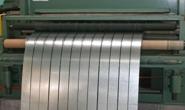Market Segment

July 25, 2014
Reliance Reports Record Sales Volume
Written by Sandy Williams
Reliance Steel and Aluminum reported a net income of $96.5 million for second quarter, up 11 percent from the previous quarter and 19 percent year over year. Sales were at a record $2.62 billion, up 2.5 percent on a quarterly basis.
Improved metals pricing contributed to improved gross profit margins. Demand was below expectations with 1,539,800 tons sold, only a 0.5 percent increase from the first quarter. The average price per ton (all products) was $1,703 per ton. Carbon steel sales totaled 1,265,000 tons.
For the outlook for third quarter, Reliance expects improving demand in third quarter with relatively stable pricing at current levels with slightly higher prices at the end of the year compared to the beginning. Acquisitions continue to be an important part of Reliance’s strategy.
“We expect to continue to be a consolidator in our highly fragmented industry by making strategic acquisitions of well-managed metal service centers and processors with end market exposures that support our diversification strategy,” said Chairman and CEO David Hannah.
During the conference call Reliance executives were asked to comment on buying patterns and the impact of imports on buyer decisions. Hannah noted that much of Reliance business is on spot orders from customers with smaller size orders that want material tomorrow. “So it’s hard to know — those aren’t the kinds of people that buy import material because there’s a long lead time for import material.”
Karla Lewis, CFO, added, “Because we don’t buy very much import material and we really focus on gross profit margins and enhancing that on the service side of the orders, we’re not the person to — for customers to come to when they want cheap material. And so you get that from the imports. That’s not really — that’s not Reliance’s bread and butter. And because of the wide spread on the import prices now and that — and a lot of import coming into the market, there might be some customers going after the lower prices right now.”
“It would be fantastic,” said Greg Mollins, President and COO, when asked whether there should be a trade case on cold-rolled and galvanized. “Typically, there’s 23% to 25% of imports coming into our country. Our production’s somewhere around about 100 million tons and normally, there’s another 23%, 25% that comes in from import. And it’s up into the mid 30s now, which is very problematic. And I think if there was a trade case filed with that, that there would be quite a few countries that would pull back, and it would provide the domestic mills an opportunity to increase their volumes.”
“That would obviously improve the pricing environment,” added Mollins. “And with the consolidation going on in — especially the recent consolidation going on, I think we’d see even more discipline from the mills and prices would go up, and that would help us, and that would help them, and that would help the whole industry. So I would applaud a trade case in any product, period.”
On the issue of pricing, Mollins noted that customers are skeptical about whether price increases will stick and some flat-rolled customers have been conservative on buys waiting to see if prices will hold.
Freight issues have not been a big issue for Reliance since the company owns its own fleet. James Hoffman, Senior Vice President for Operations added that some large orders go directly to mills sidestepping service centers. “When these big pipelines come out and tanks and all of these things, when they’re large orders and there certainly are a lot of those out there right now, they’ll go direct to the mill and the mills will ship direct to them.”







